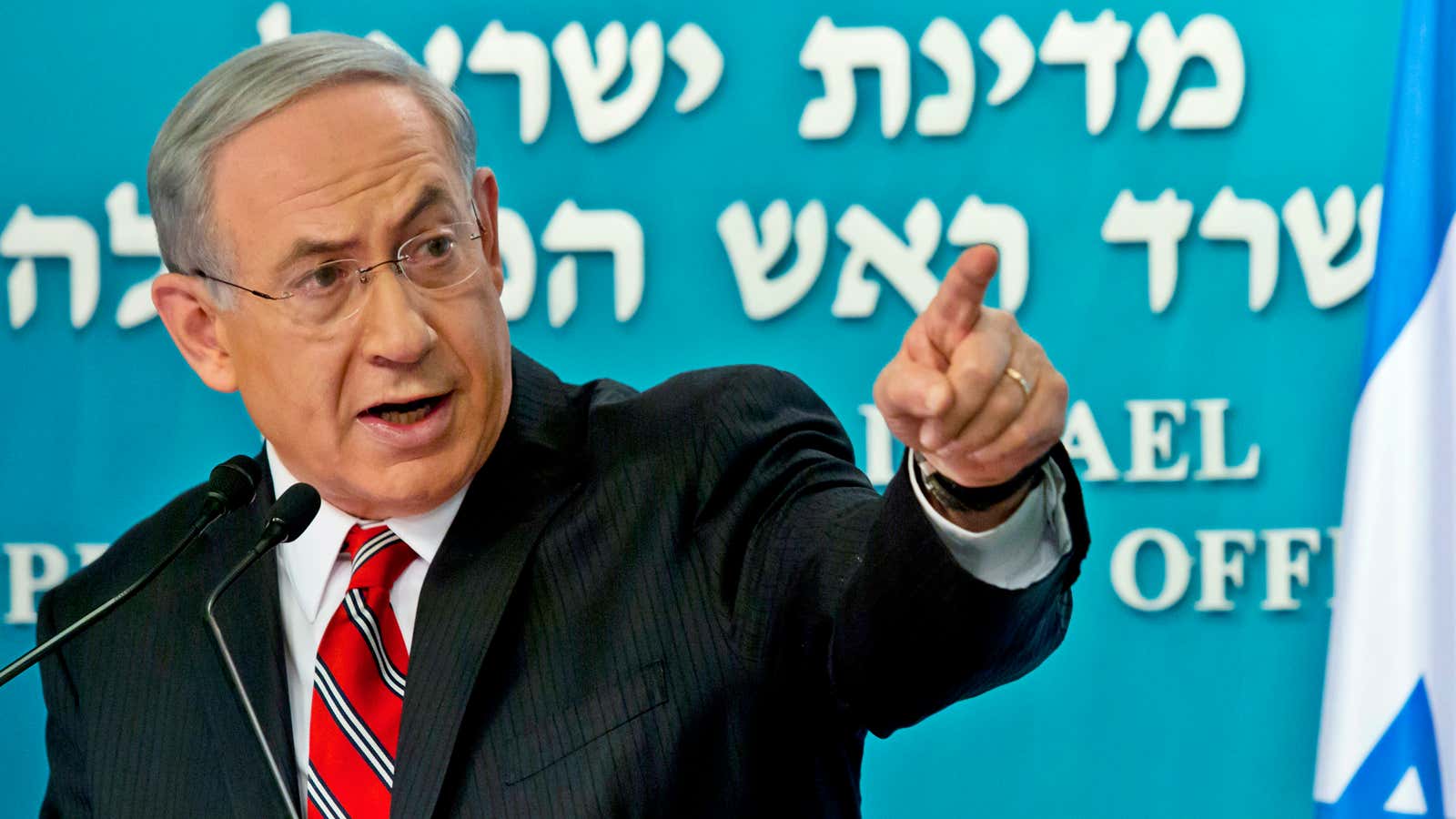“Never forget.” Like most Jewish children, I heard that exhortation repeated in Sunday school whenever we discussed the Holocaust. Before the Nazi party rose to power, Jews in Germany were assimilated, frequently respected and comfortable. They thought they were safe. The command to “never forget” was a reminder that anti-Semitism was an ongoing threat. Violence is always possible. The only way to prevent it is vigilance.
Benjamin Netanyahu didn’t actually say “never forget” in his Oct. 20 speech to the World Zionist Congress in Jerusalem. But it’s not hard to read the phrase into the subtext of his speech. Netanyahu links the Israeli-Palestinian conflict to the Holocaust by suggesting that Palestinians are promulgating “big lies” about Israel, just as Hitler promoted big lies about the Jews. Perhaps most outrageously, the prime minister blames a former Mufti of Jerusalem, Haj Amin al-Husseini, for inciting Hitler to genocide: “And Haj Amin al-Husseini went to Hitler and said, ‘If you expel them, they’ll all come here.’ ‘So what should I do with them?’ he asked. He said, ‘Burn them.’”
Blaming Muslims for the Holocaust is a breathtakingly cynical bit of historical revisionism, as others have already documented in detail. The German government was quick to point out that the Holocaust was perpetrated by Germany, not by the Mufti of Jerusalem.
While Netanyahu has since walked back his comments, it’s unlikely that his half-apology is sincere. For him, the Holocaust is a reminder that Israel must be watchful and strong, and that Jews are victims—whether of German genocide, Palestinian aggression, or world opinion. And of course, the Holocaust for Netanyahu means Israel is justified in whatever measures it takes in its long, grinding war against Gaza and the West Bank.
Netanyahu’s big lie about the Mufti may be particularly egregious, but it’s hardly isolated. In the decades that followed World War II, the Holocaust has become a frequent rhetorical touchstone, used to justify practically anything. Unfortunately, that often means that the murder of millions of innocents has been employed to argue for more violence rather than peace.
One case in point came earlier in October, when Republican presidential candidate Ben Carson argued against gun control by claiming that “the likelihood of Hitler being able to accomplish his goals would have been greatly diminished if the people had been armed.”
Carson’s assertion is as historically confused as Netanyahu’s. And it also serves much the same function. The Holocaust represents an iconic, absolute evil; the epitome of violence. If steps can be taken to avoid another Holocaust, they must be done—no matter how many people get hurt. For Netanyahu, that means that Israel can continue to evict Palestinians from their homes. For Carson, it means that Americans have to shrug off school shootings as the price of freedom.
The Holocaust has been used with some frequency to justify American aggression. Bill Clinton compared Slobodan Milosevic to Hitler while making the case for NATO’s controversial intervention in the Balkans in the early 1990s—the legality of which remains debatable. Saddam Hussein was compared to Hitler during both the first Iraq War and the second. Austrian writer and Nazi hunter Simon Wiesenthal even cheered on George W. Bush’s plans for invasion in 2002, declaring, “you cannot wait indefinitely on dictators. Adolf Hitler came to power in 1933, but for six years the world did not act.” Remembering the Holocaust in this case meant an illegal, disastrous invasion of Iraq, hundreds of thousands of deaths, and the ongoing disaster that is the Islamic State.
At times, Holocaust remembrance has even been used as a way to deny or downplay the severity of other genocides. The Holocaust, some advocates insist, was absolutely unique and cannot be compared to other atrocities. That line of reasoning has provided cover for Israel (and for that matter, for the US) to downplay the Armenian genocide at the behest of its Turkish allies. In 2000, then-Israeli Foreign Minister Simon Peres said, “We reject attempts to create a similarity between the Holocaust and the Armenian allegations. What the Armenians went through is a tragedy, but no genocide.”
“Never forget” is supposed to prevent violence. It honors victims by promising to stop people who would bring about further bloodshed.
But today, “never forget” means there is no limit to the bodies Netanyahu can pile up and no limit to the number of countries the US and its allies can invade. The threat of the Holocaust provides world leaders with a carte blanche. In the name of combating contemporary Hitlers, it seems, everything can be permitted—forever.
Violence begets violence. The Holocaust was one of the most violent events in history. Now the perpetrators of the atrocity continue to provide an excuse and incitement for further tragedy.
I don’t think we can forget the Holocaust, nor should we. But we need to be careful that we use its memory to honor the dead, not to add to their number.
